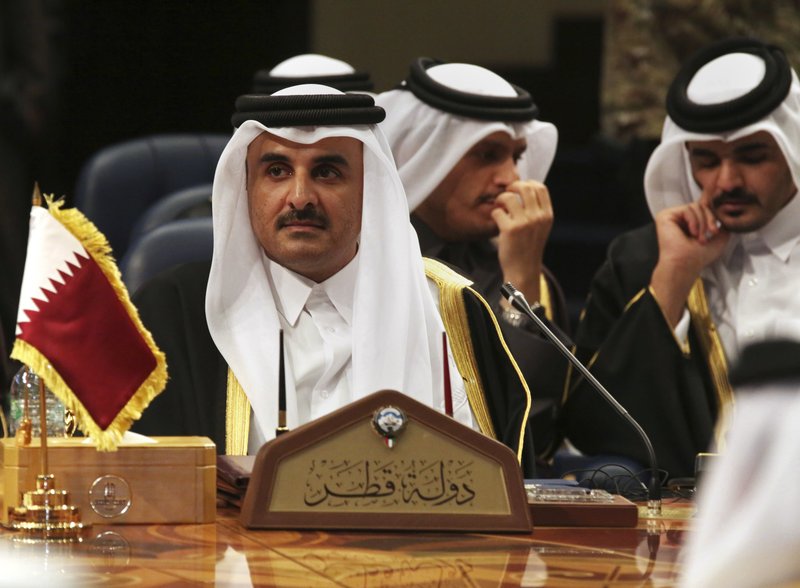KUWAIT CITY -- A two-day summit of Gulf Arab countries fell apart within hours of starting Tuesday over the ongoing boycott of Qatar, underscoring the difficulty of ending the crisis and suggesting that unifying the bloc of U.S. allies is slipping further from reach.
Even before Kuwait's 88-year-old emir began the summit of the Gulf Cooperation Council, the United Arab Emirates announced it formed a new partnership with Saudi Arabia to coordinate "all military, political, economic, trade and cultural fields," the basic goal of the council.
The United Arab Emirates and Saudi Arabia already enjoy close ties and previously signed a similar agreement last year, suggesting the latest announcement was meant to scuttle any possible reconciliation in Kuwait City. It also highlighted the inherent weakness of the six-nation council already exposed by the monthslong dispute between half of its members and Qatar.
The Gulf Cooperation Council, composed of Bahrain, Kuwait, Oman, Qatar, Saudi Arabia and the United Arab Emirates, formed in 1981, in part as a counterbalance to Shiite power Iran. Buoyed by rising oil and energy prices, it made visa-free travel arrangements among its members and pushed toward greater economic cooperation.
But a drop in oil prices, the 2011 Arab Spring and its aftermath, and other political maneuvers led to the Qatar diplomatic crisis.
The dispute began in June, after what Qatar described as a hack of its state-run news agency and the circulation of incendiary comments attributed to its ruler, Sheikh Tamim bin Hamad Al Thani. Soon after, council members Bahrain, Saudi Arabia and the United Arab Emirates closed off their airspace and seaports to Qatar, as well as the small peninsular nation's sole land border with Saudi Arabia.
The boycott initially riled Qatar, but it soon replaced food products with those flown in from Turkey and Iran.
However, Qatar's foreign reserves have dropped by some $10 billion -- a fifth of their value -- since the dispute began. Those reserves are crucial in supporting the nation's riyal, which is pegged to the U.S. dollar, as well as funding soccer's 2022 World Cup that Doha will host.
The boycotting nations claim Qatar funds extremist groups and is too cozy with Iran. Qatar has long denied funding extremists, but it shares an offshore natural gas field with Iran that gives its citizens the highest per-capita income in the world.
A similar dispute involving Qatar occurred in 2014. But this time positions have hardened against Qatar, whose support for Islamist opposition groups has angered the Arab nations now boycotting it. The United Arab Emirates in particular views Islamists as a threat to hereditary rule in its federation of seven sheikhdoms. Egypt, angered by Qatar's support for the Muslim Brotherhood and the nation's deposed President Mohammed Morsi, is also boycotting Qatar.
The U.S., which has about 10,000 troops stationed at Qatar's al-Udeid Air Base as part of its campaign against the Islamic State militant group and the war in Afghanistan, also has sought to end the crisis. Its military has halted some regional exercises to put pressure on the council to resolve the crisis. However, President Donald Trump in the meantime made comments seemingly supporting the Arab nations' efforts at isolating Qatar, complicating those efforts.
Just before the start of Tuesday's summit, the Emirati Foreign Ministry said the new "joint cooperation committee" with Saudi Arabia was approved by the United Arab Emirates' ruler and president, Sheikh Khalifa bin Zayed Al Nayhan.
The United Arab Emirates and Saudi Arabia have cultivated close ties in recent years. Emirati troops are deeply involved in the Saudi-led war in Yemen. Abu Dhabi's powerful crown prince, Mohammad bin Zayed Al Nayhan, is believed to be close to Saudi Arabia's young Crown Prince Mohammed bin Salman.
The Emirati announcement did not say whether any other Gulf Arab countries would be invited to join the new group, but the implication was clear: The two Gulf powers could strike out on their own.
Tuesday's meeting in Kuwait City was to be a summit of the region's rulers. However, only Qatar and Kuwait were represented by their ruling emirs, sparking anger online by Kuwaitis that the nations boycotting Qatar had slighted their leader.
Information for this article was contributed by Hussain al-Qatari and Malak Harb of The Associated Press.
A Section on 12/06/2017
